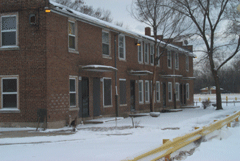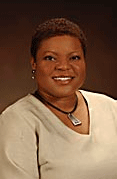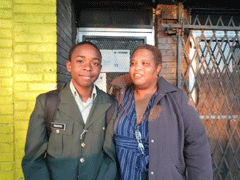A Long-Awaited Leader
Air Date: Week of November 7, 2008

Altgeld Gardens was built in 1945 on an abandoned landfill in Chicago's South Side to house returning African American veterans of World War II. It's a heavily polluted neighborhood, and the central cause in Cheryl Johnson's work with People for Community Recovery. (Courtesy of the University of Wisconsin)
Barack Obama is not only the first African American to make it to the White House...he’s also the Oval Office’s first community organizer. That has many activists in the environmental justice movement optimistic about his commitment to the environment. Host Steve Curwood speaks with Monique Harden, co-director of Advocates for Environmental Human Rights, and Cheryl Johnson, director of People for Community Recovery.
Transcript
CURWOOD: Critics of the outgoing administration say it’s not just product regulation that’s been lax – there’s also been a lack of support for environmental justice. Even so, the environmental justice movement has continued to grow. Grassroots activists keep fighting the disproportionate effects of pollution on the health and prosperity of communities of color in the United States. Joining me for a look ahead at what an Obama Administration will mean for these concerns are Monique Harden and Cheryl Johnson. Monique Harden is an attorney who co-directs Advocates for Environmental Human Rights – they’re a nonprofit law firm headquartered in New Orleans.
Ms. Harden, thanks for being here.
HARDEN: Thank you for having me, Steve.
CURWOOD: And also we have with us Cheryl Johnson. She’s the director of People for Community Recovery, a nonprofit that deals with pollution issues in the urban communities of Chicago. Ms. Johnson, hello!
JOHNSON: Hello, Steve, how you doing?
CURWOOD: So, Monique, let me start with you. How different do you think it’s going to be for the environmental justice movement having an African American for president of the United States?
HARDEN: It’s a tremendous moment. I still don’t – I am still in – it feels almost dreamlike right now, to be honest. And, I’m also very cautious about, you know, what this work and what this job – what it’s really going to take to be able to execute, and execute successfully. You know, Barack Obama’s not only the first African American as president of the United States, but he’s also the first community organizer. And I really think that the way in which Barack Obama has run his campaign has been one where he’s really inspired people to do more in terms of how they can improve their communities and the role that they want to see government play in that work. And so I think it’s one that really supports and buttresses the work of people around this country who want nothing more than a safe place to live for their children to grow up, and they see the government in the past working in ways that undermined those very basic simple goals.

Monique Harden
JOHNSON: Well, I think of this as a wake up call for the African American community. There’s not so much being dependent on the White House to do everything for us. It’s time for us to go back to our community, wake up our community, organize our community, and say now we can make change. He gave us the vision to be able to say change can happen in our community. But we have to take those steps. So the sleeping lions is now awake, and it’s just about doing what we have to do in our community to make this country a much better country.
CURWOOD: Cheryl Johnson, where you live there’s so much toxic pollution, what should be done? What do you think an Obama could get done?
JOHNSON: Well, unfortunately, because our community – I know that my community should have never been sited in an industrial area in the beginning. Okay, but that’s water under the bridge. The fact is that the community have sixty years of history, of people living in that community, and one of the things that I know in this country – we know how to dirty up things, but we don’t know how to clean up anything. So what I consider my community – not only is we’re living in a toxic donut, but we also can be in an open environmental lab, get the real engineers, get the real scientists and get the real medical experts and let’s learn from the mistakes, but give us the power, take away the red tape, take away the bureaucracy. Because we are quiet as a cat, we are the experts in our community, we just don’t have the resources to be able to do the things that we need to do in our community. One of the biggest polluter in this country is our auto industry. Now they’re in a financial crunch and we gonna bail them out to continue to pollute our environment. It’s a complex issue, and I hope that all these, you know, environmental issues, be one of imporance because of its interconnectedness and its interrelationship to every facet of life.
CURWOOD: So, Monique Harden, you wrote a recent opinion article, and I quote, “The Clean Air Act and Clean Water Act have permitted industrial facilities to contaminate communities of color, some tragically, into extinction.” What do you mean by this?
HARDEN: The problem that we have is that the laws don’t protect human health and they don’t protect and sustain our environment. And as a result of that, for example in the state of Louisiana where I live, we’ve lost five historic African American communities from contamination and pollution caused by facilities that had permits to operate. It’s a real problem to be able to look at, you know, just the physical landscape of our country and be able to point to areas that used to be communities that are no longer – that no longer exist, and they no longer exist because of really flawed environmental laws.
CURWOOD: So, Monique Harden, let me ask you this, how much pressure do you think President-elect Obama is going to be willing to put on industry?

Cheryl Johnson with Jumar Rogers a member of the People for Community Recovery Photovoice for Environmental Justice Club. (Courtesy People for Community Recovery)
CURWOOD: Barack Obama was not elected with a majority of white people in this country. The returns show that if just whites had been in the election he would have lost. But he had, of course, tremendous support from many whites and, of course, a lot of support from people of color. To what extent are you concerned that people may see activism or concern by President Obama in the area of environmental justice as working on behalf of a special interest group?
HARDEN: I think he’s got the ability, no matter what the issue is, to explain it and present in a way where everyone sees it is in their best interest. He’s got a real skill for working in a way that is really about unifying and bringing people together. I think, you know, with environmental justice, if we begin to see environmental justice as not something that would divide or alienate one group from another, but instead really unify people. I think one of the ways in which we can approach it is looking at it this way: You know we are losing communities to contamination, pollution, unsustainable hazardous developments in a number of industrial operations. Our country is only as strong as all of our communities. And if we allow some communities to be sacrificed for polluting industrial operation, then we’re sacrificing a part of ourselves.
CURWOOD: Cheryl Johnson?
JOHNSON: Well, I just want to say that this is a quality of life issue and one thing I’m clearly – I’m clear in my mind that I understand – and it has nothing to do with any kind of special interest groups or no lobbyists or anything like that – pollution has no boundaries. Pollution doesn’t discriminate. And pollution definitely does not go to Heaven. So when we’re out here fighting for better quality of air, it’s not just for my lungs, it’s for everybody’s lungs. And I think that’s probably one of the biggest problem we having is people think they are far removed from the environmental quality that they’re happening in my community and they’re not, so – it’s about your current family, it’s about your future family, it’s about the whole environmental quality of this country. I mean look at the global warming, look at the climate changes that we already experience. Do we get it? That’s just common sense to me, so if we get back to the common sense of things in our country, I think we’ll have a better clear vision as to what direction that we need to go. And I think we got the right messenger.
CURWOOD: Cheryl Johnson is director of People for Community Recovery in Chicago. Thank you so much.
JOHNSON: Thank you.
CURWOOD: Monique Harden is an attorney who co-directs Advocates for Environmental Human Rights in New Orleans. Thank you so much, Monique.
HARDEN: Thank you.
Links
Living on Earth wants to hear from you!
Living on Earth
62 Calef Highway, Suite 212
Lee, NH 03861
Telephone: 617-287-4121
E-mail: comments@loe.org
Newsletter [Click here]
Donate to Living on Earth!
Living on Earth is an independent media program and relies entirely on contributions from listeners and institutions supporting public service. Please donate now to preserve an independent environmental voice.
NewsletterLiving on Earth offers a weekly delivery of the show's rundown to your mailbox. Sign up for our newsletter today!
 Sailors For The Sea: Be the change you want to sea.
Sailors For The Sea: Be the change you want to sea.
 The Grantham Foundation for the Protection of the Environment: Committed to protecting and improving the health of the global environment.
The Grantham Foundation for the Protection of the Environment: Committed to protecting and improving the health of the global environment.
 Contribute to Living on Earth and receive, as our gift to you, an archival print of one of Mark Seth Lender's extraordinary wildlife photographs. Follow the link to see Mark's current collection of photographs.
Contribute to Living on Earth and receive, as our gift to you, an archival print of one of Mark Seth Lender's extraordinary wildlife photographs. Follow the link to see Mark's current collection of photographs.
 Buy a signed copy of Mark Seth Lender's book Smeagull the Seagull & support Living on Earth
Buy a signed copy of Mark Seth Lender's book Smeagull the Seagull & support Living on Earth

